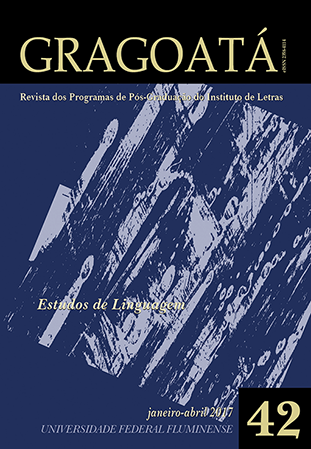Quando barreiras linguísticas geram violação de direitos humanos: que políticas linguísticas o Estado brasileiro tem adotado para garantir o acesso dos imigrantes a serviços públicos básicos?
DOI:
https://doi.org/10.22409/gragoata.v22i42.33466Palavras-chave:
Barreiras linguísticas. Imigração. Direitos humanos. Políticas linguísticas.Resumo
Este artigo apresenta uma discussão, ainda muito incipiente no Brasil, sobre as políticas linguísticas que o Estado brasileiro tem adotado para responder às barreiras linguísticas enfrentadas pelos imigrantes no acesso aos serviços públicos. Inicialmente, busca-se demonstrar, por meio de elementos jurídicos, o modo como barreiras linguísticas podem contribuir com a violação de direitos humanos básicos e também o que diz a atual legislação brasileira sobre o trato migratório. A partir do modelo teórico proposto por Ozolins (2010) sobre as políticas de oferecimento de intérpretes e tradutores no setor público, é possível afirmar que o Estado brasileiro é completamente negligente no que concerne ao oferecimento de políticas linguísticas de interpretação no setor público aos imigrantes. Além disso, a institucionalização do ensino de português para refugiados é ainda um programa federal recente e esparso. Desse modo, são as entidades voluntárias que têm assumido o papel de produzir políticas tanto de oferecimento de intérpretes quanto de ensino da língua portuguesa. A falta de ação do Estado revela, nesse sentido, uma orientação ideológica que ou nega a presença das línguas dos imigrantes ou vê essa diversidade como um problema a ser superado por meio do ensino da língua portuguesa.
---
DOI: http://dx.doi.org/10.22409/gragoata.2017n42a909
Downloads
Downloads
Publicado
Edição
Seção
Licença
AUTORIZAÇÃO
Autores que publicam em Gragoatá concordam com os seguintes termos:
Os autores mantêm os direitos e cedem à revista o direito à primeira publicação, simultaneamente submetido a uma licença Creative Commons Atribuição 4.0 Internacional (CC BY 4.0), que permite o compartilhamento por terceiros com a devida menção ao autor e à primeira publicação pela Gragoatá.
Os autores podem entrar em acordos contratuais adicionais e separados para a distribuição não exclusiva da versão publicada da obra (por exemplo, postá-la em um repositório institucional ou publicá-la em um livro), com o reconhecimento de sua publicação inicial na Gragoatá.
A Gragoatá utiliza uma Licença Creative Commons - Atribuição CC BY 4.0 Internacional.











